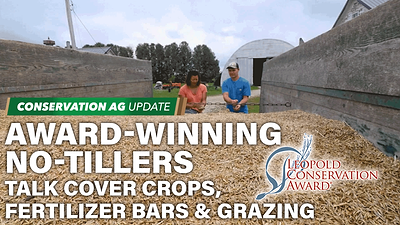In a press release Oct. 11 from Penn State Extension, they announced three Penn State research teams have received awards totaling $1.78 million from the U.S. Department of Agriculture's National Institute of Food and Agriculture to investigate climate-smart approaches to pest control in agriculture.
The grants are part of the institute’s Pests and Beneficial Species in Agricultural Production Systems program area, which is aimed at facilitating new biological-based strategies for managing plant pests. The projects will be led by researchers in the College of Agricultural Sciences and will cover various aspects of the evolution of herbicide resistance and how insects can play a role in reducing plant damage from pests and weeds.
Tracing herbicide resistance in Italian ryegrass — led by Caio Brunharo, assistant professor of weed science
Herbicides help farmers prevent or eliminate harmful weeds such as Italian ryegrass, a winter annual grass weed. But as these undesirable plants evolve to be more resistant to the chemicals that help control them, farmers may experience economic losses and other impacts.
Brunharo’s project will explore whether the herbicide-resistant populations of Italian ryegrass in the U.S. are genetically related or whether they evolved independently. The researchers also will identify the genes involved in herbicide resistance.
The project will be vital for safeguarding sustainable agricultural practices by addressing the spread of herbicide resistance, Brunharo said.
“Understanding the genetic basis of this resistance will help farmers implement more effective weed management strategies, protecting both crop yields and the environment,” he said. “This research not only has national implications but also paves the way for innovations in diagnosing and controlling herbicide resistance across the agricultural landscape.”
Using predatory-insect cues for mitigating pest damage — led by Sara Hermann, assistant professor of arthropod ecology and trophic interactions and Tombros Early Career Professor
To help limit pesticide resistance, Hermann said, there’s a growing need to find environmentally friendly, sustainable ways to manage pests while mitigating risks to humans and other animals.
One novel strategy uses chemical cues emitted by predatory insects to drive away herbivorous insects that feed on important crops. Hermann’s project will examine the odors emitted by ladybugs and determine how they communicate threat levels to aphid pests, one of their primary food sources.
“Our goal is to investigate a completely novel way to approach pest management by manipulating the ‘ecology of fear,’” she said. “Similar to how small-scale farmers use scarecrows to deter bird pests, we will introduce predatory insect odors to fields to deter insect pests from feeding on crop plants.”
Hermann added that she and her team hope the findings will revolutionize biological control approaches by enhancing plant health and production while reducing reliance on conventional pesticides, thereby contributing to more resilient agricultural systems.
The overlooked beneficial role of ants in no-till agriculture — led by John Tooker, professor of entomology
Ants have a large influence on the areas around their nests: Above ground, they act as predators, and below ground, they affect soil properties. But while their roles have been well studied in tropical and subtropical agriculture, less is known about how they affect temperate agricultural systems in the U.S.
In this project, Tooker and research colleagues are aiming to characterize and quantify the influence of ant communities in crop fields — contributions they anticipate will be significant.
He added that if their experiments support this hypothesis, it will supply more evidence to encourage growers to adopt integrated pest management — which involves understanding local pest populations and using insecticides only if they will provide an economic benefit — in their crop fields.
“To manage insect pests, growers who use IPM rely on scouting information to justify insecticide use and seek to avoid unnecessary use of insecticides,” Tooker said. “By minimizing unnecessary insecticides, we expect to be able to protect ant communities and allow them to control insect pests, remove weed seeds and enrich soil nutrients to improve crop productivity.”





